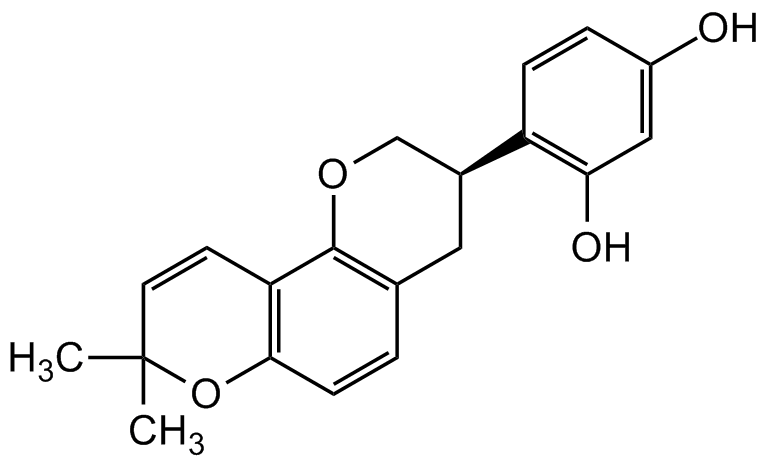
Chemical Structure
Glabridin [59870-68-7]
CDX-G0194
CAS Number59870-68-7
Product group Chemicals
Estimated Purity>98%
Molecular Weight324.37
Overview
- SupplierChemodex
- Product NameGlabridin [59870-68-7]
- Delivery Days Customer2
- CAS Number59870-68-7
- CertificationResearch Use Only
- Estimated Purity>98%
- Molecular FormulaC20H20O4
- Molecular Weight324.37
- Scientific DescriptionChemical. CAS: 59870-68-7. Formula: C20H20O4. MW: 324.37. Glabridin is a prenylated isoflavonoid found in licorice (Glycyrrhiza glabra L.) root extract that is reported to possess antiviral, antimicrobial, anti-inflammatory, antidiabetic, antiatherogenic, antioxidant, antitumor and estrogen-like properties. These diverse biological activities are largely related to the capacity of glabridin to down-regulate reactive oxygen species, bind to antioxidant effectors and act as a selective estrogen receptor modulator. On a molecular level it is, next to other targets, activating PPARgamma, inhibiting JNK1/2 and human carboxylesterase 2 (CES2A). Based on its antioxidant capacity it is also studied as an anti-aging cosmetic agent. Recently, it has been shown in docking experiments to have high binding affinity to the main protease of SARS-CoV-2. - Glabridin is a prenylated isoflavonoid found in licorice (Glycyrrhiza glabra L.) root extract that is reported to possess antiviral, antimicrobial, anti-inflammatory, antidiabetic, antiatherogenic, antioxidant, antitumor and estrogen-like properties. These diverse biological activities are largely related to the capacity of glabridin to down-regulate reactive oxygen species, bind to antioxidant effectors and act as a selective estrogen receptor modulator. On a molecular level it is, next to other targets, activating PPARgamma, inhibiting JNK1/2 and human carboxylesterase 2 (CES2A). Based on its antioxidant capacity it is also studied as an anti-aging cosmetic agent. Recently, it has been shown in docking experiments to have high binding affinity to the main protease of SARS-CoV-2.
- SMILESCC1(C)C=CC2=C(C=CC3=C2OC[C@@H](C4=C(O)C=C(O)C=C4)C3)O1
- Storage InstructionRT
- UNSPSC12352200


![Glabridin [59870-68-7]](https://www.targetmol.com/group3/M00/35/76/CgoaEGayH92EHmj5AAAAABam2sY299.png)